#Hsin Yin Sung
Explore tagged Tumblr posts
Text
Lost in Perfection (2023) Movie Review
Lost in Perfection – Movie Review Director: Hsin Yin Sung (On Happiness Road) Cast Yu-Wei Shao (Hello Ghost) Mei-Hsiu Lin (Forever Young) Rhydian Vaughn (Concubine of Shanghai) Figaro Tseng (More than Blue) Tien-Chu Lee (The Golden Years) Chia-Kuei Chen (Ro Sun) Plot: TV anchor life unravels when she discovers her dad become the victim of a romance scam. Making matters worse, the scammer…

View On WordPress
#2023#Figaro Tseng#Hsin Yin Sung#Lost in Perfection#Mei-Hsiu Lin#Rhydian Vaughn#Thriller#Yu-Wei Shao
0 notes
Text
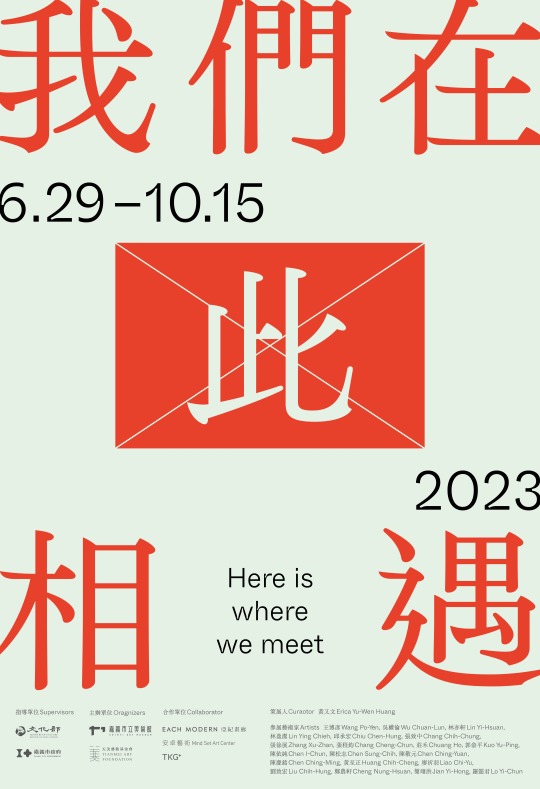
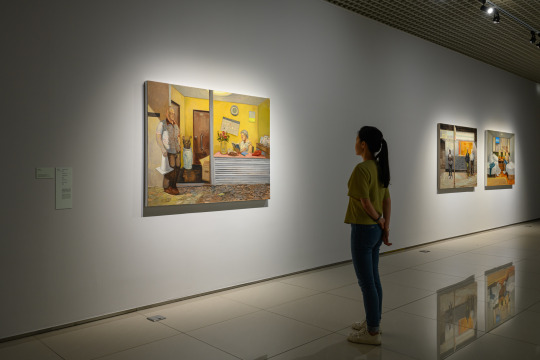
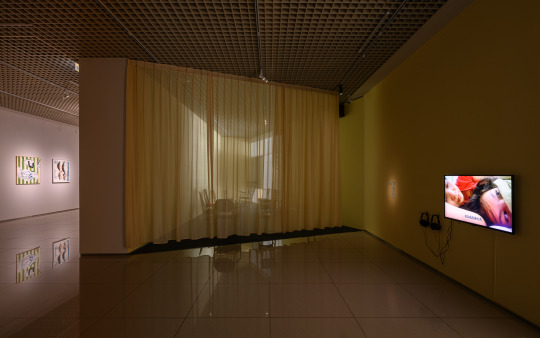




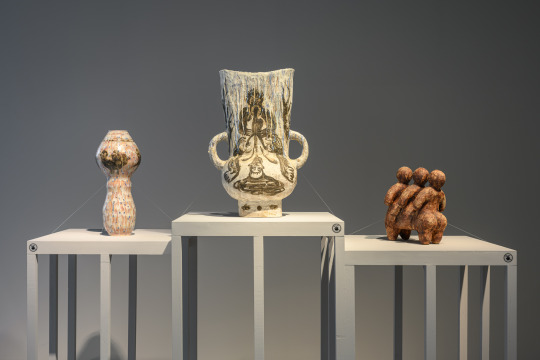

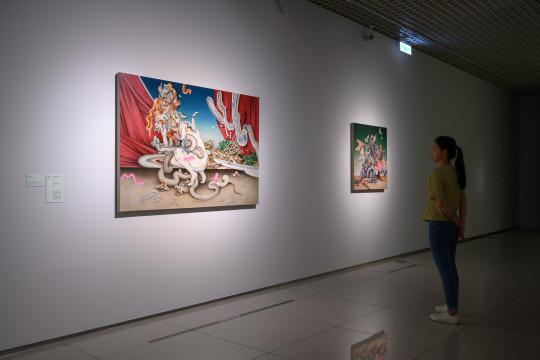

Here is where we meet
Here is where we meet 2023/06/29-10/15 Venue: Chiayi Art Museum 1F-3F Supervisors:Ministry of Culture, Chiayi City Government Organizers:Chiayi Art Museum, Tianmei Art Foundation Collaborators:TKG+, Mind Set Art Center, Each Modern Curator:Erica Yu-Wen Huang Artists:Wang Po-Yen, Wu Chuan-Lun, Lin Yi-Hsuan, Lin Ying-Chieh, Chiu Chen-Hung, Chang Chih-Chung, Zhang Xu-Zhan, Chang Cheng-Chun, Chuang Ho, Kuo Yu-Ping, Chen I-Chun, Chen Sung-Chih, Chen Ching-Yuan, Chen Ching-Ming, Huang Chih-Cheng, Liao Chi-Yu, Liu Chih-Hung, Cheng Nung-Hsuan, Jian Yi-Hong, Lo Yi-Chun Archive Room - Participating Artists:Ding Chien-Chung, Niu Jun-Qiang, Wang Po-Yen, Shih Meng-Hsin, Wu Chuan-Lun, Li Yi-Fan, Li Ting-Huan, Lin Hao-Bai, Lin Yi-Wei, Lin Ying-Chieh, Chiu Chen-Hung, Chiu Chien-Jen, Hung Sheng-Hsiung, Hsu Yin-Ling, Shiu Sheng-Hung, Chang Chih-Chung, Zhang Xu-Zhan, Chang Cheng-Chun, Chang San-Hsueh, Chuang Ho, Kuo I-Chen, Kuo Yu-Ping, Chen I-Chun, Chen Sung-Chih, Chen Kuan-Ying, Chen Fei-Hao, Chen Ching-Yuan, Chen Ching-Ming, Huang Chih-Cheng, Huang Xuan, Yang Han-Chiao, Liao Chi-Yu, Liao Zen-Ping, Liu Chih-Hung, Liu Feng-Ling, Cheng Nung-Hsuan, Ou Jing-Yun, Hsieh Jhou-Yu, Jhong Jiang-Ze, Lo Chan-Peng, Luo Jr-Shin, Lo Yi-Chun
1 note
·
View note
Link
[Warning: Spoilers Ahead]
When Lin Shu-Chi returns to her childhood home in Taiwan, she finds everything changed. The fetid, canal running through her neighborhood is now a tidy town park and the buildings leveled by the 1999 Jiji earthquake have been rebuilt. Everything seems new and odd, an uncanny reflection of what she once knew as a little girl, having returned home with a life and husband in America and a child on the way. As an immigrant, she never felt truly at home in the States, baffled by the corporate uniformity of the suburbs and embarrassed by her half-white niece who thinks Chinese cooking is smelly and gross. She is similarly displaced in Taiwan, fielding a chorus of questions about being her parents “American daughter” when she wanders down old familiar streets. Chi’s not American, but she’s not exactly Taiwanese either—at least not the Taiwan that arose from the ashes of Chiang Kai-shek’s dictatorship in the 70s. Being one-fourth Amis—one of Taiwan’s aboriginal peoples cruelly suppressed by the refugee Nationalist government fleeing mainland Communists—she was mercilessly bullied in school: mocked by her classmates, her teachers beat every trace of Amis out of her, forbidding her from speaking her native Hokkien in favor of Mandarin. Now in middle age, Chi doesn’t know who she is but she knows what she is: miserable, unfulfilled, lost.
This listlessness born from ethnic ambiguity is central to Hsin Yin Sung’s superb On Happiness Road, an autobiographical Taiwanese animated film receiving its North American debut at this year’s New York Asian Film Festival. It’s deliberately childlike art style—one based on over-simplified geometric shapes, sequences of superfluid movement, and deceptively simple color palettes—makes the film seem like a series of Kindergarten drawings brought to life, promising a whimsical story of life and love. This is Sung’s trap. What appears on the surface to be a superficial Taiwanese riff on Studio Ghibli, particularly the family tales of Isao Takahata, is actually one of the most nuanced and complex animated dramas since Marjane Satrapi and Vincent Paronnaud’s Persepolis (2007). The two films share many obvious similarities: both are coming of age stories about optimistic girls growing into conflicted, resigned adults against a historical backdrop of political unrest; both feature protagonists escaping their hyper-conservative native countries to live as expats in the West; both are productions from countries not particularly renowned for native animation industries. While Persepolis’ protagonist Marji benefited from a distinct cultural identity, one that grounded her tumultuous transition to womanhood and independence, Chi finds herself in a state of constant ethnic flux, one seemingly prophesied by her being born the same day of Kai-shek’s death when Taiwan was plunged into political unrest. It is this treatment of racial fluidity that elevates Sung’s wistful coming-of-age story into an essential work.
To read the rest of this review, click on the link!
Published on TheYoungFolks.com
#On Happiness Road#★★★★#New York Asian Film Festival#NYAFF 2018#Editorial#2017#Taiwanese Cinema#TheYoungFolks#TheYoungFolks.com#The Young Folks#Hsin Yin Sung
6 notes
·
View notes
Text
top cinéma / 2018

1. EN LIBERTÉ !
2. UNE AFFAIRE DE FAMILLE
3. L’ÎLE AU TRÉSOR
4. 3 BILLBOARDS, LES PANNEAUX DE LA VENGEANCE
5. HAPPINESS ROAD
6. BURNING
7. PHANTOM THREAD
8. TESNOTA, UNE VIE A L’ETROIT
9. LETO
10. THE RIDER
#Top#topcinema#topciné#topcinéma#en liberté#une affaire de famille#l'île au trésor#3 billboards#happiness road#burning#phantom thread#tesnota#leto#the rider#pierre salvadori#hirokazu koreeda#martin mcdonagh#sung hsin-yin#lee chang-dong#pta#paul thomas anderson#kantemir balagov#kirill serebrennikov#chloé zhao#top cinéma 2018#top 2018
1 note
·
View note
Text
A Guide to Taiwanese Name Romanization
Have you ever wondered why there are so many Changs when the surname 常 is not actually that common? Have you ever struggled to figure out what sound “hs” is? Well don’t worry! Today we are going to go over some common practices in transliterating names from Taiwan.
With some recent discussion I’ve seen about writing names from the Shang-Chi movie, I thought this was the perfect time to publishe this post. Please note that this information has been compiled from my observations--I’m sure it’s not completely extensive. And if you see any errors, please let me know!
According to Wikipedia, “the romanized name for most locations, persons and other proper nouns in Taiwan is based on the Wade–Giles derived romanized form, for example Kaohsiung, the Matsu Islands and Chiang Ching-kuo.” Wade-Giles differs from pinyin quite a bit, and to make things even more complicated, transliterated names don’t necessarily follow exact Wade-Giles conventions.
Well, Wikipedia mentioned Kaohsiung, so let’s start with some large cities you already know of!
[1] B → P 台北 Taibei → Taipei [2] G → K [3] D → T In pinyin, we have the “b”, “g”, and “d” set (voiceless, unaspirated) and the “p”, “k”, and “t” set (voiceless, aspirated). But in Wade-Giles, these sets of sounds are distinguished by using a following apostrophe for the aspirated sounds. However, in real life the apostrophe is often not used.
We need some more conventions to understand Kaohsiung. [4] ong → ung (sometimes) [5] X → Hs or Sh 高雄 Gaoxiong → Kaohsiung I wrote “sometimes” for rule #4 because I am pretty sure I have seen instances where it is not followed. This could be due to personal preference, historical reasons, or influence from other romanization styles.
Now some names you are equipped to read: 王心凌 Wang Xinling → Wang Hsin-ling 徐熙娣 Xu Xidi → Shu/Hsu Hsi-ti (I have seen both) 黄鸿升 Huang Hongsheng → Huang Hung-sheng 龙应台 Long Yingtai → Lung Ying-tai 宋芸樺 Song Yunhua → Sung Yun-hua
You might have learned pinyin “x” along with its friends “j” and “q”, so let’s look at them more closely. [6] J → Ch [7] Q → Ch 范玮琪 Fan Weiqi → Fan Wei-chi 江美琪 Jiang Meiqi → Chiang Mei-chi 郭静 Guo Jing → Kuo Ching 邓丽君 Deng Lijun → Teng Li-chun This is similar to the case for the first few conventions, where an apostrophe would distinguish the unaspirated sound (pinyin “j”) from the aspirated sound (pinyin “q”). But in practice these ultimately both end up as “ch”. I have some disappointing news.
[8] Zh → Ch Once again, the “zh” sound is the unaspirated correspondent of the “ch” sound. That’s right, the pinyin “zh”, “j”, and “q” sounds all end up being written as “ch”. This can lead to some...confusion. 卓文萱 Zhuo Wenxuan → Chuo Wen-hsuan 陈绮贞 Chen Qizhen → Chen Chi-chen 张信哲 Zhang Xinzhe → Chang Shin-che At least now you finally know where there are so many Changs. Chances are, if you meet a Chang, their surname is actually 张, not 常.
Time for our next set of rules. [10] C → Ts [11] Z → Ts [12] Si → Szu [13] Ci, Zi → Tzu Again we have the situation where “c” is aspirated and “z” is unaspirated, so the sounds end up being written the same. 曾沛慈 Zeng Peici → Tseng Pei-tzu 侯佩岑 Hou Peicen → Hou Pei-tsen 周子瑜 Zhou Ziyu → Chou Tzu-yu 黄路梓茵 Huang Lu Ziyin → Huang Lu Tzu-yin 王思平 Wang Siping → Wang Szu-ping
Fortunately this next convention can help clear up some of the confusion from above. [14] i → ih (zhi, chi, shi) [15] e → eh (-ie, ye, -ue, yue) Sometimes an “h” will be added at the end. So this could help distinguish some sounds. Like you have qi → chi vs. zhi → chih. There could be other instances of adding “h”--these are just the ones I was able to identify. 曾之乔 Zeng Zhiqiao → Tseng Chih-chiao 施柏宇 Shi Boyu → Shih Po-yu 谢金燕 Xie Jinyan → Hsieh Jin-yan 叶舒华 Ye Shuhua → Yeh Shu-hua 吕雪凤 Lü Xuefeng → Lü Hsueh-feng
Continuing on, a lot of the conventions below are not as consistently used in my experience, so keep that in mind. Nevertheless, it is useful to be familiar with these conventions when you do encounter them.
[16] R → J (sometimes) Seeing “j” instead of “r” definitely confused me at first. Sometimes names will still use “r” though, so I guess it is up to one’s personal preferences. 任贤齐 Ren Xianqi → Jen Hsien-chi 任家萱 Ren Jiaxuan → Jen Chia-hsüan 张轩睿 Zhang Xuanrui → Chang Hsuan-jui
[17] e → o (ke, he, ge) I can see how it would easily lead to confusion between ke-kou, ge-gou, and he-hou, so it’s important to know. I’ve never seen this convention for pinyin syllables like “te” or “se” personally. 柯震东 Ke Zhendong → Ko Chen-tung 葛仲珊 Ge Zhongshan→ Ko Chung-shan
[18] ian → ien [19] Yan → Yen I’ve observed that rule 18 seems more common than 19 because I see “yan” used instead of “yen” a fair amount. I’m not really sure why this is. 柯佳嬿 Ke Jiayan → Ko Chia-yen 田馥甄 Tian Fuzhen → Tien Fu-chen 陈建州 Chen Jianzhou → Chen Chien-chou 吴宗宪 Wu Zongxian → Wu Tsung-hsien
[20] Yi → I (sometimes) I have seen this convention not followed pretty frequently, but two very famous names are often in line with it. 蔡英文 Cai Yingwen → Tsai Ing-wen 蔡依林 Cai Yilin → Tsai I-lin
[21] ui → uei I have seen this convention used a couple times, but “ui” seems to be much more common. 蔡立慧 Cai Lihui → Tsai Li-huei
[22] hua → hwa This is yet another convention that I don’t always see followed. But I know “hwa” is often used for 华 as in 中华, so it’s important to know. 霍建华 Huo Jianhua → Huo Chien-hwa
[23] uo → o This is another example of where one might get confused between the syllables luo vs. lou or ruo vs. rou. So be careful! 罗志祥 Luo Zhixiang → Lo Chih-hsiang 刘若英 Liu Ruoying → Liu Jo-ying 徐若瑄 Xu Ruoxuan → Hsu Jo-hsuan
[24] eng → ong (feng, meng) I think this rule is kinda cute because some people with Taiwanese accents pronounce meng and feng more like mong and fong :) 权怡凤 Quan Yifeng → Quan Yi-fong
[25] Qing → Tsing I am not familiar with the reasoning behind this spelling, but 国立清华大学 in English is National Tsing Hua University, so this spelling definitely has precedence. But I also see Ching too for this syllable. 吴青峰 Wu Qingfeng→ Wu Tsing-fong
[26] Li → Lee Nowadays a Chinese person from the Mainland would probably using the Li spelling, but in other areas, Lee remains more common. 李千那 Li Qianna → Lee Chien-na
[27] Qi → Chyi I have noticed this exception. However, I’ve only personally noticed it for this surname, so maybe it’s just a convention for 齐. 齐秦 Qi Qin → Chyi Chin 齐豫 Qi Yu → Chyi Yu
[28] in ←→ ing In Taiwanese Mandarin, these sounds can be merged, so sometimes I have noticed ling and lin, ping and pin, etc. being used in place of each other. I don’t know this for sure, but I suspect this is why singer A-Lin is not A-Ling (her Chinese name is 黄丽玲/Huang Liling).
[29] you → yu I personally haven’t noticed these with other syllables ending in “ou,” only with the “you” syllable. 刘冠佑 Liu Guanyou → Liu Kuan-yu 曹佑宁 Cao Youning → Tsao Yu-ning
There is a lot of variation with these transliterated names. There are generally exceptions galore, so keep in mind that all this is general! Everyone has their own personal preferences. If you just look up some famous Taiwanese politicians, you will see a million spellings that don’t fit the 28 conventions above. Sometimes people might even mix Mandarin and another Chinese language while transliterating their name.
Anyway, if any of you know why 李安 is romanized as Ang Lee, please let me know because it’s driving me crazy.
Note: The romanized names I looked while writing this post at were split between two formats, capitalizing the syllable after the hyphen and not capitalizing this syllable. I chose to not capitalize for all the names for the sake of consistency. I’m guessing it’s a matter of preference.
#romanization#transliteration#taiwan#chinese name#chinese names#cross-strait chinese#chinese#mandarin#chinese language#mandarin chinese#langblr#studyblr#langblog#language learning#language stuff#language study#language#languages#language lover#chinese langblr#chinese studyblr#mandarin langblr#mandarin studyblr#learn chinese#learn mandarin#learning chinese#learning mandarin#study chinese#study mandarin#studying chinese
272 notes
·
View notes
Text
ANIME NEWS: Competition lineups discovered for brand new Chitose airfield film fest

Anime Illustration by Yoko Kuno. Provided by New Chitose airfield International Animation fete govt Committee
The competition has been whittled down within the feature and short film classes for the fifth annual New Chitose airfield International Animation fete.
Five titles square measure currently within the running within the moving-picture show competition from a complete of forty nine works submitted from twenty five countries and regions.
For the short film competition, a record high two,043 comes from eighty six countries and regions were submitted for thought. Now, seventy six titles square measure appointive in 5 classes.
The pageant are control November. 2-5 at Hokkaido’s main airfield entry.
The 5 films up for the inaugural choice for the Feature anime Films are: Denis Do’s “Funan,” that won the highest MDMA for a moving-picture show at the 2018 Annecy International Animation fete in France; Sung Hsin-Yin’s “On Happiness Road”; “Shonen Hollywood--Holly Stage For You-- Complete Edition,” co-directed by Sumiko Arai and Toshimasa Kuroyanagi; Nora Twomey’s “The Breadwinner”; and brandy James Roels and Emma First State Swaef’s “This splendid Cake!”
The Selection for the Short anime Films is for animated works of half-hour or less.
The Student Competition was additional to the current year’s lineup, which incorporates International, Family, Japan and Music Animation competitions.
The titles enclosed within the International Competition are: “World of Tomorrow Episode Two” by cheat on honor politician Don Hertzfeldt; Niki Lindroth von Bahr’s “The Burden,” that won the MDMA for a brief Film at Annecy in 2017; Sun Xun’s “Time Spy”; and Atsushi Wada’s “Autumn from Antonio Vivaldi’s ‘The Four Seasons.’”
ANIME NEWS: ‘Dragon Ball Super’-themed escape game control in eight cities
An escape game together with the anime “Dragon Ball Super” animated TV series has started out in national capital and 7 alternative cities across Japan.
The “Chikyu-jin Shometsu kara no Chodasshutsu” (the super shake the extinction of humanity) can run till Dec. thirty one in Tokyo’s Shimokitazawa district, additionally as in city, Sendai, Yokohama, Nagoya, Osaka, Okayama and city.
Participants should defend the peace by aggregation Dragon Balls with Goku before Freeza will. The villain has come back to Earth out of the blue to gather all the seven mystical balls that summon a wish-granting dragon once gathered and desires to become immortal and carry off humanity.
Players use their smartphones and tablets as a anime 2018 Dragon measuring device to resolve mysteries and crack codes to find Dragon Balls that are scattered round the city.
In addition to regular tickets, special tickets bundled with an artless bag are offered for the event.
3 notes
·
View notes
Text
Movie Review: On Happiness Road (2017)
Movie Review: On Happiness Road (2017)
Title: On Happiness Road Release Date: October 15, 2017 Director: Sung Hsin-yin Production Company: Happiness Road Productions Summary/Review: Chi (Gwei Lun-mei) returns home to Taiwan from America for the funeral of her grandmother (Giwas Gigo). While there she imagines conversations with her grandmother and reflects upon her childhood (voiced by Bella Wu in flashbacks). The non-linear…
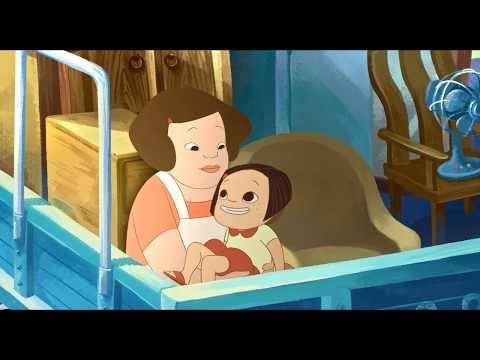
View On WordPress
1 note
·
View note
Photo


"Happiness Road" dessin-animé de Hsin Yin Sung, août 2018.
4 notes
·
View notes
Video
youtube
Trailer for On Happiness Road, a Taiwanese animated film by Sung Hsin-Yin, based on her animated short from 2013. The film premiered at the Busan International Film Festival in South Korea, and will play in Taiwanese theathers as of December.

279 notes
·
View notes
Text
Passez un moment en famille avec le film « Happiness Road »
Pour passer un moment relaxant en famille, l’appli iTunes PlayVOD Max met plusieurs films d’animation à votre disposition. Parmi les titres disponibles en VOD sur le portail, vous pourrez vous divertir avec « Happiness Road ». C’est une production de Hsin-Yin Sung sortie le 1er août 2018.

0 notes
Link
“The valley spirit that doesn’t die we call the dark womb the dark womb’s mouth we call the source of Heaven and Earth as elusive as gossamer silk and yet it can’t be exhausted”
-Lao-tzu- (Taoteching, verse 6, translation by Red Pine)
THE SHANHAICHING says, “The Valley Spirit of Morning Light is a black and yellow, eight-footed, eight-tailed, eight-headed animal with a human face��� (9). The Shanhaiching’s “valley spirit’ is the moon, which runs ahead of the sun during the last eight days of its thirty-day cycle, lags behind during the first eight days, and faces the sun during its eight days of glory. For the remaining days of the month, it’s too close to the sun to be visible. Like many other cultures, the ancient Chinese viewed the moon as the embodiment of the female element of creation.
WANG PI says, “The valley is what is in the middle, what contains nothing, no form, no shadow, no obstruction. It occupies the lowest point, remains motionless, and does not decay. All things depend on it for their development, but no one sees its shape.”
YEN FU says, “Because it is empty, we call it a ‘valley.’ Because there is no limit to its responsiveness, we call it a ‘spirit.’ Because it is inexhaustible, we say ‘it doesn’t die.’ These three are the virtues of the Tao.”
SU CH’E says, “A valley is empty but has form. A valley spirit is empty but has no form. What is empty and has no form is not alive. So how can it die? ‘Valley spirit’ refers to its virtue. ‘Dark womb’ refers to its capacity. This womb gives birth to the ten thousand things, and we call it ‘dark’ because we see it give birth but not how it gives birth.”
HSUEH HUI says, “The words Lao-tzu chooses are often determined by the demands of rhyme and should not be restricted to their primary meaning. Thus, p’in [female animal] can also be read p’in [womb].”
HO-SHANG KUNG says, “The valley is what nourishes. Those able to nourish their spirit do not die. ‘Spirit means the spirits of the five organs: the gall bladder, the heart, the kidneys, and the spleen. When these five are injured, the five spirits leave. ‘Dark’ refers to Heaven. In a person, this means the nose, which links us with Heaven. ‘Womb’ refers to Earth. In a person, this means the mouth, which links us with Earth. The breath that passes through our nose and mouth should be finer than gossamer silk and barely noticeable, as if it weren’t actually present. It should be relaxed and never strained or exhausted.”
WU CH’ENG says, “The empty valley is where spirits dwell, where breath isn’t exhausted. Who relaxes their breath increases their vitality. Who strains their breath soon expires.”
TE-CH’ING says, “Purposeful action leads to exhaustion. The Tao is empty and acts without purpose. Hence, it can’t be exhausted.”
SUNG CH’ANG-HSING says, “The valley spirit, the dark womb, the source of Heaven and Earth all act without acting. That we don’t see them doesn’t mean they don’t exist.”
LIU CHING says, “It’s like the silk of a silkworm or the web of a spider: hard to distinguish and hard to grab. But then, it isn’t Humankind who uses it. Only the spirit can use it.”
TU TAO-CHIEN says, “This verse also appears in Liehtzu: 1.1, where it is attributed to the Yellow Emperor instead of Lao-tzu. Lao-tzu frequently incorporates passages from ancient texts. We see their traces in ‘thus the sage proclaims’ or ‘hence the ancients say.’ Thus Confucius said, ‘I don’t create. I only relate’ [Lunyu: 7.1]”.
LIEH-TZU says, “What creates life is not itself alive” (Liehtzu: 1.1).
–
Today’s verse is hard for a completely different reason than yesterday’s verse. Yesterday’s verse was hard because it exposed our hypocrisy, when we say we value impartiality. Today’s verse is hard simply because of how elusive (hard to grasp) the Tao actually is.
What is this Valley Spirit? Is it a black and yellow, eight-footed, eight-tailed, eight-headed animal with a human face, as the Shanhaiching says? Does it refer to our Moon, as Red Pine suggests? As I was reading along, I thought it was reminiscent of the Creation story in the Bible with which I became familiar as a child: “In the beginning God created the heavens and the earth. Now the earth was formless and empty, darkness was over the surface of the deep, and the Spirit of God was hovering over the waters” (Genesis 1:1-2 NIV). This is the moment just before God says “Let there be light!”
Such diverse imagery for what Lao-tzu calls “the dark womb.” And, “the dark womb’s mouth…the source of Heaven and Earth.”
It is yin. Female, dark, still, empty, brooding, waiting, giving birth to all things… It is elusive. Like the silk of a silkworm or the web of a spider, hard to distinguish and hard to grasp. We reach for it, but can’t quite grasp it. We can see its manifestations. But, how? That eludes us.
There must be some purpose. That was what always intrigued me about that early part of the Creation story in Genesis. Why is the Spirit just hovering over the waters? What is it doing? What is going on here? Can we just skip to the next verse, where the “real” action starts?
Ah, but Te-ch’ing tells us “Purposeful action leads to exhaustion. The Tao is empty and acts without purpose. Hence, it can’t be exhausted.”
Acting without purpose, without effort, without struggling – that, is the practice of the Tao. Our journey through the Taoteching will be spent being still, being empty, brooding, waiting, learning to act without purpose, without effort, without struggling.
That is the purpose. We can’t wait to see what we will become. But that isn’t the Tao. It isn’t about what we will become. It is about being, and not-being. Especially not-being.
–
Red Pine introduces the following with today’s verse:
THE SHANHAICHING (BOOK OF MOUNTAINS AND WATERS). Shaman’s guide to China’s mountains and rivers. Attributed to Yu the Great (fl. 2200 B.C.), it was edited into its present form by Liu Hsin (ca. 50 B.C.- A.D. 23). A reliable English translation was published by Taiwan’s National Institute for Compilation and Translation in 1985.
YEN FU (1853-1921). Naval officer, scholar, and the first Chinese commentator to use Western philosophical concepts in interpreting Lao-tzu. Lao-tzu tao-te-ching p’ing-tien.
HSUEH HUI (1489-1541). Official, classical scholar, and student of the occult. His work on the Taoteching is notable for its critical review of previous commentaries. Lao-tzu chi-chieh and Lao-tzu k’ao-yi.
TU TAO-CHIEN (FL. 1264-1306). Taoist master and author of commentaries to a number of Taoist classics. His Taoteching commentary makes extensive use of quotes from the Confucian classics. Tao-te-hsuan-ching yuan-chih.
YELLOW EMPEROR (CA. 2700-2600 B.C.). Patriarch of Chinese culture. He was also among the earliest known practitioners of Taoist yoga and other hygienic arts.
LIEH-TZU (FL. 4TH C. B.C.). Taoist master about whom we know nothing other than that he could ride the wind. The book that bears his name was probably the work of his disciples and later generations of Taoists. The present version dates from the fifth century A.D.
1 note
·
View note
Text
Más On Happiness Road en Movistar+ Cine Doc&Roll en abril
Más On Happiness Road en Movistar+ Cine Doc&Roll en abril
Basada en las propias experiencias de su juventud, la directora taiwanesa Sung Hsin-yin debuta en el largometraje de animación con este emotivo homenaje a la infancia, que Movistar+ CineDoc&Roll emite de nuevo el martes 9 de abril a las 08:00. Lin Hsu Chi es una mujer nacida en Taiwán en los años 70 que ahora está casada y […]
View On WordPress
0 notes
Text
دانلود انیمیشن On Happiness Road 2017

دانلود فیلم On Happiness Road 2017 (Hsing fu lu shang) با لینک مستقیم « فیلم جاده خوشبختی » کیفیت Bluray 720p اضافه شد « دانلود رایگان با لینک مستقیم و سرعت بالا از هی دانلود » « محصول کشور تایوان »

تاریخ اکران : 2018 ژانر : انیمیشن , غم انگیز , خانوادگی کیفیت : Bluray 720p امتیاز : 6.9 اطلاعات بیشتر : IMDb ستارگان : Lun-Mei Kwei, Te-Sheng Wei, Bor Jeng Chen کارگردان : Hsin Yin Sung خلاصه ای از داستان : "چی" رویای اش را با پشتکار در درس خواندن به دست آورد. بعد از مرگ مادربزرگش، او به نزد خانوادهاش در جاده خوشبختی برمیگردد؛ جایی که او را یاد خاطرات دوران کودکیاش میاندازد و به تفکر درباره زندگی و خانه وادار میکند. خوشبختی چیست؟ آیا "چی" میتواند خوشبختی خود را پیدا کند...

دانلود با کیفیت Bluray 720p

800 مگابایت

دانلود زیرنویس این فیلم

جهت دانلود بهتر است از نرم افزارهای ��دیریت دانلود (Download manager) استفاده نمایید.

در ارسال نظرات از نام مناسب و ایمیل صحیح استفاده کنید.

لطفا در قسمت نظرات از ارسال توهین و کلمات نامناسب و نامربوط خودداری کنید.

درصورتی که مشکل یا سوالی داشتید از طریق فرم تماس با ما اقدام کنید.

جهت درخواست فیلم یا سریال از فرم درخواست اقدام کنید. Read the full article
#تریلرفیلمOnHappinessRoad2017#دانلودانیمیشنجادهخوشبختی#دانلودرایگانفیلمOnHappinessRoad2017#دانلودفیلمOnHappinessRoad2017بازیرنویسفارسی#دانلودفیلمOnHappinessRoad2017باکیفیتعالی#دانلودفیلمOnHappinessRoad2017بالینکمستقیم
0 notes
Text
Photo captured from the Hong Kong International Film & TV Market’s Website
The Eye on Taiwan news staff
Some 60 Taiwan-based audiovisual representatives and post-production companies will take part in the Hong Kong International Film and TV Market (FILMART), one of the world’s leading entertainment marketplaces, to promote Taiwan-made quality films and dramas.
The Taiwanese firms will join 850 exhibitors from 37 countries and regions to promote their products in the four-day FILMART, which will kick off in Hong Kong on Monday.
The trade fair is one of the nine events under the Expo Hong Kong, which will open on the same day with a kick-off ceremony, according to the organizer, the Hong Kong Trade Development Council.
Taiwan’s Bureau of Audiovisual and Music Industry Development under the Culture Ministry said the participation in the fair will not only help promote Taiwan productions in the global market but also exhibit Taiwan’s prowess in digital production and special effects.
Photo taken from High Flash’s Facebook
Photo taken from Sen Sen’s Facebook
Photo taken from Father to Son’s Facebook
Bureau Director Hsu Yu-chun was quoted in a press statement by the ministry as saying that Taiwan has selected three films — Explosion (引爆點) by Chuang Ching-shen (莊景燊), Sen Sen (生生) by An Bon (安邦), and Father to Son (范保德) by Hsiao Ya-chuan (蕭雅全) — for display and viewing during the trade fair to highlight the dynamics of the local movies.
To present the creativity, culture, and landscapes of Taiwan, the television series chosen include Iron Ladies (姊的時代), Angel Wei Wei (天使薇薇), and the Taiwan-Japan joint venture Fusulina of Remember (紡綞蟲的記憶)” that explores life, love, cyberculture, and the relations between Taiwan and Japan, according to the press release.
Photo taken from Set Drama’s Facebook
Photo taken from Videoland Angel Vivi’s Facebook
The bureau has also set up two Taiwan pavilions at the trade fair for audiovisual operators to promote their works and business. A Taiwan-themed promotional event will also be held on March 19 to seek collaborative opportunities with professionals and companies from all over the world, it said.
Several visual effects companies from Taiwan, including Bulky Animation Studio (大腕影像股份有限公司), Jnana Studio (本覺創意有限公司), Taipei Postproduction (台北影業股份有限公司), Cheer Digiart (砌禾數位動畫股份有限公司), and Motion M VFX (米德媒體有限公司) will participate in the trade fair as well, according to the press statement.
Hong Kong–Asia Film Financing Forum (HAF), a platform for Asian filmmakers with new film projects seeking financing and meetups with potential partners, will also be held in conjunction with FILMART, it noted.
This year, director Arvin Chen’s (陳駿霖) upcoming film project Naive Melody (買一送一) and director Huang Xi’s (黃熙) Common People (普通情事) were selected by HAF. They will be meeting with film financiers, producers, distributors, and buyers during the three-day forum to seek opportunities for advancing their projects to the next stage, the statement said.
Photo taken from Xiao Mei’s Facebook
Following FILMART, two Taiwanese films – Omotenashi (盛情款待) by emerging director Jay Chern (陳鈺杰) and Xiao Mei (小美) by Maren Hwang (黃榮昇) – will open the 2018 Hong Kong International Film Festival on March 19. Another five Taiwanese films will also be screened at the festival this year, according to the press statement.
Fusulina of Remember (紡綞蟲的記憶), a drama series jointly produced by Taiwan and Japan, was released on Taiwan’s first streaming application “i・active APP” on Feb. 14, according to the Culture Ministry.
Subsidized by the ministry and the Bureau of Audiovisual and Music Industry Development’s Broadband TV Production project, the drama is a collaborative project targeting the Pan-Asian market.
Filmed in Japan, the drama opens a new page for cultural exchanges and commercial partnerships. It stars both Taiwanese and Japanese actors and actresses to boost cultural interactions and understanding between the two nations. The drama will also be aired in Japan for Japanese audiences to watch quality drama produced with Taiwanese characteristics, the ministry said.
Photo taken from Fusulina of Remember’s Facebook
Fusulina of Remember discusses topics on vegetation and land and explores the relationship between Taiwan and Japan over the centuries. It seeks to create a heart-warming story that integrates the cultures, societies, and aesthetics of Taiwan and Japan, it said.
7 Taiwan’s films screened during 2018 Hong Kong International Film Festival
March 19, 7:30 pm — Omotenashi (盛情款待)” by emerging director Jay Chern (陳鈺杰) discusses how cultural differences between a Taiwanese and Japanese family and emotions change the lives of those involved.
March 19, 9:45 pm — Xiao Mei (小美) by director Maren Hwang (黃榮昇) draws viewers’ curiosity and concerns about the missing titular character through a series of interviews with her friends, family, and acquaintances. The film was nominated for the GWFF Best First Feature Award in Berlin International Film Festival in January.
Photo taken from IMDB.com
March 23, 8:00 pm — Cloud of Romance (我是ㄧ片雲) by actor-turned-director Chen Hung-lieh (陳鴻烈) is one of the 14 movies starring former Taiwanese actress Brigitte Lin Ching-hsia (林青霞) which will be screened during the festival as a tribute to the actress highly popular in Taiwan and Hong Kong. The movie — a digital restoration of its 1977 version — tells of bitter, triangular love which ends in a tragedy.
Photo taken from YouTube
March 24, 4:45 pm — Father (Orignal Title : Red Box) is a documentary which has taken director Yang Li-chou (楊力州) 10 years to finish. It is about the strained relationship between puppet master Chen Hsi-huang (陳錫煌) and his father Li Tien-lu (李天祿), the renowned Taiwanese glove puppeteer. At the age of 79, Chen set up his own troupe, which soon earned recognition all over the world. Nevertheless, Chen finds no one to pass on his great skills.
Photo taken from On Happiness Road’s Facebook
March 25, 6:00 pm –The animation film On Happiness Road (幸福路上) by Sung Hsin-yin (宋欣穎) tells of how kids wish they could become celebrities in their adulthood, but after they grow up, they just desire to have an ordinary yet happy life.
Photo taken from The Deserted’s Facebook
March 31, 1:30 pm — The Deserted (家在蘭若寺) by iconoclastic art house director Tsai Ming-liang (蔡明亮) involves a man recovering from an illness, who is unable to communicate properly with either his mother or the female ghost who lives next door. Instead, he communes with a fish. At 56 minutes, it is the longest-ever VR film best viewed with the Vive VR headset developed by HTC and Valve Corp. The headset uses room-scale tracking technology that the company says “allows the user to move in 3D space and use motion-tracked handheld controllers to interact with the environment,” according to Variety.com
April 2, 8:00 pm — Secret Love in Peach Blossom Land, directed by Stan Lai (賴聲川), is another movie being shown as a tribute to Taiwanese actress Brigitte Lin (林青霞). It combines two unrelated plays – a tragedy (Secret Love) and a comedy (The Peach Blossom Land) – on the same stage, mixing seriousness with banters.
Photo taken from YouTube
Brigitte Lin honored in both Hong Kong and Italy-based Udine film festivals
To honor Lin, who holds a legendary status in Taiwan and Hong Kong cinema, the Hong Kong International Film Festival will screen 14 of her films and publish a retrospective book (Filmmaker in Focus: Brigitte Lin Ching-hsia. It will also hold a public seminar on March 31, in which the actress will discuss her film career.
In April, the Udine Far East Film Festival based in Italy will honor the 63-year-old former actress with its Golden Mulberry Lifetime Achievement Award.
Photo taken from IMDB.com showing Brigitte Lin in Cloud of Romance released in 1977.
Lin, who retired from her acting career in 1994, has starred in more than 100 films, appearing in “sentimental melodramas and wuxia titles, to thrillers and eccentric experimental projects,” which the festival will “distill” into a retrospective that will include the European premiere of “Cloud of Romance” (1977), which was recently restored by the Taiwan Film Institute, organizer of the Udine festival said in a press release. The 20th Far East Film Festival will be held April 20-28.
Seminar on March 31, 6:00 pm — Filmmaker in Focus: Brigitte Lin Ching-hsia 「雲外笑紅塵——林青霞」專題選映 (Venue: Grand Theatre at Hong Kong Cultural Center)
Photo taken from Hong Kong International Film Festival’s Facebook showing the book “Filmaker in Focus: Brigitte Lin” published by the festival organizer
14 films by Brigitte Lin screened during the film festival:
1. Outside the Window (窗外) (1973)
2. Ghost of the Mirror (古鏡幽魂) (1974) 3. The Dream of the Red Chamber (金玉良緣紅樓夢) (1977) 4. Cloud of Romance (我是一片雲) (1977) 5. Love Massacre (愛殺) (1981) 6. All the Wrong Spies (我愛夜來香) (1983) 7. Peking Opera Blues (刀馬旦) (1986) 8. Starry is the Night (今夜星光燦爛) (1988) 9. Red Dust (滾滾紅塵) (1990) 10. Swordsman II (笑傲江湖II東方不敗) (1992) 11. Secret Love in Peach Blossom Land (暗戀桃花源) (1992) 12. The Bride with White Hair (白髮魔女傳) (1993) 13. Chungking Express (重慶森林) (1994) 14. Ashes of Time (東邪西毒終極版) (1994/2008)
Some 60 Taiwan-based audiovisual representatives and post-production companies will take part in the Hong Kong International Film and TV Market (FILMART), one of the world's leading entertainment marketplaces, to promote Taiwan-made quality films and dramas. The Eye on Taiwan news staff Some 60 Taiwan-based audiovisual representatives and post-production companies will take part in the Hong Kong International Film and TV Market (FILMART), one of the world's leading entertainment marketplaces, to promote Taiwan-made quality films and dramas.
0 notes
Photo

"Happiness Road" dessin-animé de Hsin Yin Sung, août 2018.
3 notes
·
View notes